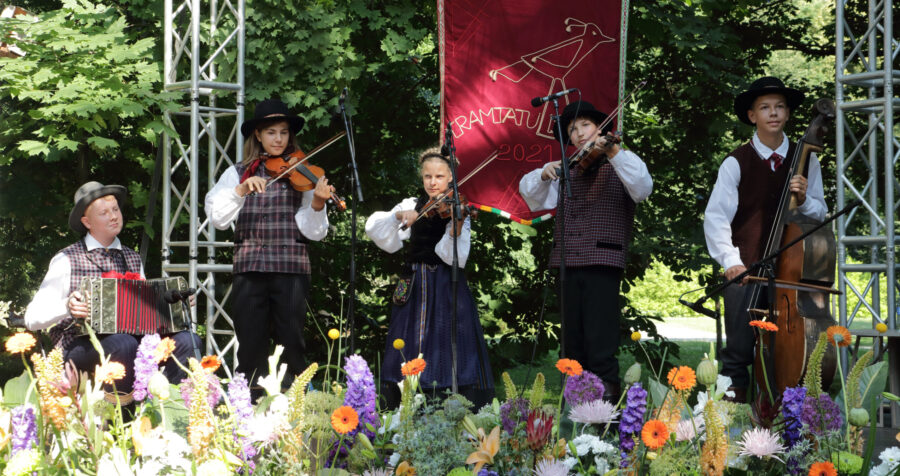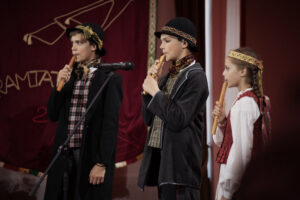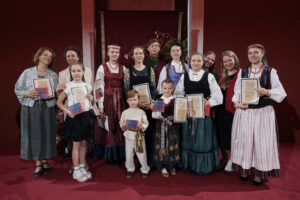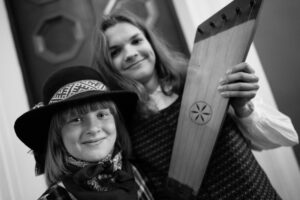Tramtatulis- Children and Schoolchildren Folklore Contest

Background
Main picture: From the contest in 2021. Photo: Andrius Morkūnas, ©Lithuanian National Culture Centre.
“The first time I took part in the contest Tramtatulis, my eyes just lit up as I saw that there are so many children cherishing traditional culture: they sing, play music and tell stories. I am very happy to have had the opportunity to participate in it twice. I have improved myself by singing and by listening to others. The experience one gains during this contest is priceless and unforgettable.”
Quote from a participant from Šilutė ,on the contest Tramtatulis.
In 2001, the members of Kaunas children and youth folklore groups, studios and clubs came up with an idea to organize a competitive festival of soloist children and schoolchildren folk performers, based on the notion that collective performances could hold back individual children, their personalities and skills. Since 2005, Children and Schoolchildren Folklore Contest Tramtatulis has been taking place all over the country. While preserving the individuality, groups (of 2–6 people) can also apply in order to reflect the diversity of singing and musical traditions.
Nationwide scope
The contest help to discover children of extraordinary talents in singing, playing music and storytelling not only in major cities, but also in the most remote areas of Lithuania. It is held every two years in three rounds: at the local, regional and national level. Almost all municipalities participate, some of them organize events every year.
Each contest also has a special theme, for example, it has been dedicated to commemorate the year of Lithuanian regions, national costume and mounds, as well as to pay tribute to the acclaimed folklore and mythology researchers and collectors. Therefore, each time the laureates and diploma winners’ gala and the laureates’ concert takes place in different places of Lithuania.A distinctive feature of this event is its diverse content. It presents the major genres of the Lithuanian folklore: songs, sutartinės, traditional music played solo with various instruments (panpipes, horns, bark or wood pipes, bagpipes, Lithuanian zithers, violins, bellow instruments) or in groups of various compositions, oral folklore (legends, myths, fairy-tales). The participants perform the works of all regions, genres and styles. The performers differ in age as well, which helps to better understand the child’s relationship with the tradition and the expression of one’s individuality ranging from a toddler to a young person developing a unique personality.
The participants of the contest are pre-school and school children, young people until the age of 19, as well as their teachers: educators, the leaders of the folklore groups, family members, etc. Usually, the contest attracts around 1000 participants. It is the only contest for children and schoolchildren of this scale, which encompasses singing, musical and dialectal storytelling traditions, where the main evaluation criterion is the perception and the delivery of the stylistics of all kinds of intangible cultural heritage forms.

From the final concert of „Tramtatulis“, Children and Youth Folklore Contest 2023, Vilnius City Hall
Photo: Gabrielius Jauniškis, ©Lithuanian National Culture Centre,
Identifying threats and the need for safeguarding
There is a need of various means of recognizing and acquiring traditions. One of the most effective ways to embrace singing, music playing and storytelling traditions is to become a part of the Children and Schoolchildren Folklore Contest Tramtatulis.
The role of the education system is particularly important in safeguarding folklore performing traditions among children and young people. The biggest threats concern the specialist and the teacher trainings, educational programs, where the traditional culture, including performing traditions clearly lack attention. Ethnology and folk art are no longer taught at Lithuanian higher education institutions, only the Department of Ethnomusicology of the Lithuanian Academy of Music and Theatre trains a wide-range profile musicologists specializing in traditional music. The integrated education on traditional culture in schools is particularly fragmented. Future educators, music and primary school teachers studying at higher education schools gain very little knowledge of folk art. They lack practical skills to get children and young people interested in their country’s intangible cultural heritage, and to develop and improve their pupils’ skills of singing traditional songs, playing traditional instruments and storytelling. The greatest role in the chain of the transmission of knowledge is played by a group of children and youth folklore groups’ leaders, also, by some teachers – the enthusiasts of fostering traditional culture, who are able to spark the interest in the younger generation. Unfortunately, there is still a lack of such people.
Objectives
Through participation in the contest Tramtatulis, the younger generation is encouraged to take interest in their native areas’ intangible cultural heritage, strengthen and expand the perception of their cultural identity, which forms the children’s, youth’s and the society’s in general positive outlook towards folk culture, promotes children’s and schoolchildren’s self-expression and creativity in the field of traditional culture, develops their artistic skills, educates future folklore and dialects bearers, folklore performers (singers, musicians and storytellers), participants of the folklore movement, related events and initiators, involving as many young people as possible in these activities. All the goals are achieved through performances, memorable concerts, sound and video recordings, broadcasts, and the organization of theoretical and practical trainings for children and teachers.
How it was done
In today’s society some of the most active tradition practitioners in Lithuania are children and youth folklore groups, studios and clubs. The majority of the members of the said communities are motivated to take part in the contest Tramtatulis. One more group of participants is kindergarteners and students of various types of schools (music, art, primary, secondary, gymnasiums) – they are trained by teachers and kindergarten educators. A contestant’s performance is preferred to reflect the represented region, the songs and stories should be sung and told in dialect. It is especially encouraged to choose the repertoire from one’s family – grandparents, great-grandparents, relatives, as well as the place where one lives. Some of participants, while outgrowing their age group, improve their narrative or singing skills, others choose different musical instruments or play in groups of different composition each year. There are also those who have mastered several traditional instruments or works of various types of folklore. For this purpose two new nominations were established – Multitalented musician and The best of the best. Some participants prepare themselves for the contest. The judges select laureates and diploma winners from the five age groups and the different genres of folk art. The national round laureates, diploma winners and their teachers are awarded prizes during a beautiful laureates’ concert, which is broadcasted on TV or the internet, and, finally, the laureates are recorded in sound studios, which later release CDs. These are used as methodological tools for other teachers and folklore ensemble leaders. Also, the public is invited to listen and learn about the talented children, who masterfully and uniquely convey folklore. Tramtatulis laureates are invited to participate in various events, celebrations and TV programs.
The contest is organized by various education and culture institutions, it is facilitated by NGOs and volunteers. The main organizer is the Lithuanian National Culture Centre.
The context of the contest does not only convey performances, teaching children, but also the professional development of teachers in traditional singing, playing music or storytelling. Each contest is preceded by regional seminars “Child as a performer of folklore”, which introduce the contest goals, the musical folklore and the oral folklore of respective Lithuanian regions, the sources for repertoires, the peculiarities of the performance styles and manners, it also examines the video material from the previous contests. Moreover, Samogitia and Lithuania Minor regional folklore groups’ leaders and educators gather for a two-day theoretical and practical folklore workshops Tramtatulis Academy. Practical sessions are dedicated to both educators and children, various creative tasks are provided and the opportunity to learn from the best practices is introduced. During the period of the preparation for the contest Tramtatulis, some individual or groups consultations for local teachers can be provided by experts and consultants of various folklore fields.

From the final concert of „Tramtatulis“, Children and Youth Folklore Contest 2023, Vilnius City Hall
Photo:
Gabrielius Jauniškis, ©Lithuanian National Culture Centre,
Key factors. Sharing experiences from the safeguarding activity.
From a contest to a broad movement
Eventually, the contest has evolved into a Tramtatulis movement, and the participants has become a community of like-minded people. The contest and the related implemented measures have helped to discover many children of extraordinary abilities and skills, formed and revealed many talented singers, musicians and local-tongue storytellers not only from the major cities, but also from many remote Lithuanian towns and villages, where the connection to local living traditions is very strong and they are practiced naturally. It is most rewarding when the former laureates become educators themselves, prepare their pupils for the contest, and they later become the laureates themselves. The group of teachers training the children for the contest has also expanded. In addition to teachers and ensemble leaders, the participants are also prepared by family members – mothers, fathers and grandmothers.
It is also important that the teachers understand the meaning of safeguarding traditions very well, and educate their students on their native dialects, characteristic repertoires, musical styles’ features. Students from Aukštaitija region (Northeast Lithuania) learn about their particular multipart singing tradition sutartinės and playing on archaic instruments (horns, panpipes, Lithuanian zithers), Samogitians (Weastern Lithuanians) are taught about their particular polyphonic singing, students form Dzūkija (Southeast Lithuania), respectively, about monophonic singing, which is characteristic to their region, etc.
There is no doubt, that the contest contributes a lot to raising awareness of traditional culture and music among children and young people, to the improvement in the qualities of performing, to the safeguarding of regional traditions, as well as to the advance in teachers’ competencies and knowledge. Moreover, the perception of the value and the diversity of folk creations, and the performance skills expand among the young people who take part in the contest. They master subtleties of the preferred folklore genres (often of more than one), some prepare for the contest by themselves, and the former winners coach their students.

Photo: Gabrielius Jauniškis, ©Lithuanian National Culture Centre,
Summing up. Some reflections.
Because of the contest Tramtatulis and related measures, many talented and creative children – singers, musicians and storytellers – were discovered all around Lithuania. There are children and teachers eagerly waiting for the contest to start in order to take part each year.
Teachers have become more and more motivated to work with children and youth on the basis of traditional culture; their qualifications have improved. Moreover, the educators’ community has expanded. Often children are also trained by their family members. Many participants grow as performers and personalities within this contest. They become great tradition representatives as singers, musicians and storytellers in the society and as examples to other performers. A number of them have chosen traditional music studies at the Lithuanian Academy of Music and Theatre, others lead their own folklore groups. Some former laureates of Tramtatulis have become the initiators and organizers of other competitions and workshops dedicated to traditional culture.
However, in a broader perspective, folk music, its language and sound variations are rarely experienced among children and young people in families, except within the folk groups’ communities. It is necessary to come up with engaging forms of introducing traditional music and teaching of it. Dialects are spoken less and less in the regions, therefore, it is important to invite and motivate teaching schools and kindergartens about local dialects.
